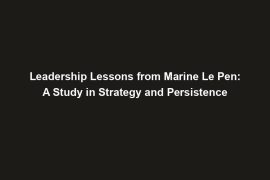Hey there, history buffs! Today, we’re diving into the fascinating world of Clovis I, a figure who may not be as well-known as some other historical leaders, but certainly left a lasting impact on the world. Clovis I was a Frankish king who lived in the 5th century and is often credited with founding the Merovingian dynasty in France. His conquests and unification of various tribes under his rule marked a significant turning point in European history.
But you might be wondering, why should we care about some guy from over a thousand years ago? Well, it turns out that Clovis I’s leadership style and decisions still hold relevance today. His military strategies and tactics, his ability to unite disparate groups, and his clever use of religion to strengthen his rule all provide valuable lessons that can be applied to contemporary leadership.
In this blog post, we’ll explore the leadership lessons we can learn from Clovis I, and how his techniques can still be valuable in modern times. So, buckle up and get ready to journey back in time to uncover some timeless insights from a truly remarkable leader. Let’s dive in!
Leadership Lessons from Clovis I
Now that we’ve learned a bit about who Clovis I was and his significance in history, let’s dive into the leadership lessons we can draw from his reign. The Frankish king was known for his military prowess and strategic acumen, which ultimately led to the expansion of his kingdom and the unification of various tribes under his rule.
Clovis I’s Military Strategies and Tactics
Clovis I was a master tactician on the battlefield. He employed a combination of cunning maneuvers, surprise attacks, and innovative tactics to outsmart his enemies and emerge victorious in battle. By studying his opponents and adapting his strategies to suit the situation, Clovis was able to secure numerous military victories and expand his kingdom’s territory.
Ability to Unite Disparate Groups
One of Clovis I’s most remarkable leadership qualities was his ability to unite disparate groups under his rule. By forming strategic alliances, forging strong relationships with key influencers, and appealing to the common interests of different tribes, Clovis was able to create a sense of unity and cohesion among his diverse subjects. This skill in bringing people together under a common cause is a valuable lesson for modern leaders seeking to build strong teams and foster collaboration in the workplace.
Use of Religion to Strengthen Power
Clovis I also understood the power of religion as a tool for strengthening his authority. By converting to Christianity and aligning himself with the Catholic Church, Clovis was able to gain the support of religious leaders and harness the influence of the Church to bolster his legitimacy as a ruler. This strategic move not only solidified his power but also helped to unify his kingdom under a shared sense of faith and identity.
By studying Clovis I’s military strategies, his ability to unite disparate groups, and his use of religion to strengthen his power, modern leaders can glean valuable insights into effective leadership practices. His enduring impact on history serves as a testament to the timeless relevance of these lessons in the realm of leadership and serves as a source of inspiration for aspiring leaders looking to make their mark on the world.
Applying Clovis I’s Lessons to Modern Leadership
Now that we have delved into the leadership lessons we can learn from Clovis I, let’s shift our focus to how we can apply these insights to modern leadership scenarios.
Comparison to Modern Leaders
When we look at the leadership style of Clovis I, we can draw parallels to modern leaders who have successfully employed similar tactics. For example, like Clovis I, successful leaders today understand the importance of strategic military planning, uniting diverse teams, and leveraging the power of belief systems to strengthen their authority. By studying the strategies of Clovis I, we can gain a deeper understanding of how effective leadership transcends time and is applicable in various contexts.
Application in the Workplace
In the workplace, leaders can apply Clovis I’s lessons by implementing thoughtful military strategies to navigate challenges and achieve goals. By studying how Clovis I united disparate groups under his rule, modern leaders can learn how to build cohesive and high-performing teams. Additionally, leveraging the power of shared beliefs and values can help leaders inspire and motivate their employees towards a common purpose. By incorporating these leadership strategies into their own practices, leaders can enhance their effectiveness and drive better results in the workplace.
Conclusion: The Enduring Impact of Clovis I’s Leadership
In conclusion, the leadership lessons we can learn from Clovis I are not only relevant in historical contexts but also hold significant value in modern leadership scenarios. By examining how Clovis I utilized military strategies, united diverse groups, and leveraged religion to strengthen his authority, we can gain valuable insights into effective leadership practices that are timeless. By applying these lessons to our own leadership roles, we can improve our abilities to navigate challenges, build strong teams, and inspire others towards a common goal. Just as Clovis I’s leadership left an enduring impact on history, so too can we leave our mark on contemporary society by learning from his example.



